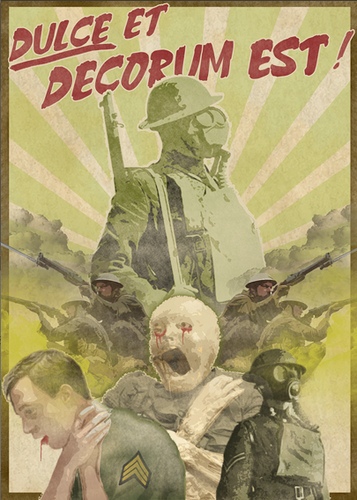10 Facts about Dulce et Decorum est
Get the details about a poem written by Wilfred Owen on Facts about Dulce et Decorum est. In 1920, the poem was published after his death. Actually, Owen wrote it during the First World War. The poem narrates the condemnation of war. It is also famous with the horrific imagery of war. The title is taken from Latin. The meaning is “it is sweet and honorable”. Let us get other interesting ideas about Dulce et Decorum est in the following pots below:
Facts about Dulce et Decorum est 1: the draft
In the first half of October 1917, Dulce et Decorum est was drafted at Craiglockhart. In January to March 1918, the work was modified at Scarborough or Ripon.
Facts about Dulce et Decorum est 2: Susan Owen
Susan Owen was the mother of Wilfred Owen who received the surviving manuscript.

Dulce et Decorum est Image
Facts about Dulce et Decorum est 3: the formal version of the poem
The formal version of the poem has two sonnets. The irregularity is seen on the stanzas’ spacing.
Facts about Dulce et Decorum est 4: the special issue in the poem
The special issue talked in the poem was related to the usage of chlorine gas by the British army during the first world war. Look at facts about Donatello here.

Dulce et Decorum est Pic
Facts about Dulce et Decorum est 5: the effect of the chlorine gas
The chlorine gas used in the war was depicted having a very bad impact to the soldiers. When a soldier could not wear the mask in time, he had to face the gruesome effect.
Facts about Dulce et Decorum est 6: the last stanza
The last stanza is considered as the strongest point narrated in the Dulce et Decorum est. It has a letter for a civilian propagandist of the first world war named Jessie Pope.

Dulce et Decorum est
Facts about Dulce et Decorum est 7: the content of the first draft
The content of the first draft was intended for Pope. Then it was revised so that the poem is dedicated for a certain Poetess. He tried to use the poem to grab the wider readers.
Facts about Dulce et Decorum est 8: the title
The title is taken from Ode III.2.13 written by Horace, a Roman poet. The phrase was “Dulce et decorum est pro patria mori”. Get facts about Aaron Douglas here.

Dulce et Decorum est Facts
Facts about Dulce et Decorum est 9: the meaning
“Dulce et decorum est pro patria mori” has the meaning of “how sweet and honorable it is to die for one’s country”.
Facts about Dulce et Decorum est 10: the old lie
Owen called the phrase in his work as the old lie in the last stanza.

Facts about Dulce et Decorum est
Do you have any comment on facts about Dulce et Decorum est?



